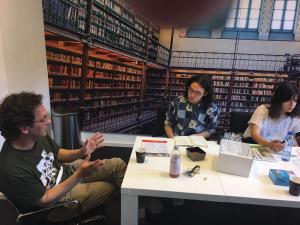 Following on its highly acclaimed first semester intensive in fall 2015 (Potash Hill, Fall 2015), Speech Matters returned this spring to focus on criminal justice reform. This year’s program looked at how politicians, social service providers, community members, and the recently incarcerated talk about responsibility, redemption, and the opportunity to move forward.
Following on its highly acclaimed first semester intensive in fall 2015 (Potash Hill, Fall 2015), Speech Matters returned this spring to focus on criminal justice reform. This year’s program looked at how politicians, social service providers, community members, and the recently incarcerated talk about responsibility, redemption, and the opportunity to move forward.
“The first iteration of Speech Matters focused on addiction and how rural and urban communities were dealing with the opioid epidemic,” says Meg Mott, politics professor and director of the semester intensive. “Some of the activists we met were in law enforcement and some had been formerly incarcerated—it made sense to broaden our network of partners into the criminal justice system.”
Each year, more than 700,000 individuals are released from prison, and another 9 million are sent home from local jails. Within three years, chances are strong that each of these individuals will re-offend and find themselves back in jail, suggesting that the school-to-prison pipeline only works in one direction. Together, Speech Matters students explored ways to improve the chances for those who have served their time.
“We front-loaded the theory,” says Jeff Hiam, a junior who participated in the semester. “We started out with reading Foucault—if you haven’t read that, it’s something else— and then read The New Jim Crow: Mass Incarceration in the Age of Colorblindness. That book really changed the national discourse on criminal justice, and it had a tremendous effect on me.”
In addition to looking at principles behind the various political arguments—libertarian, liberal, and conservative—students did much of their learning outside of the classroom, visiting correctional facilities and advocacy groups in Vermont, New Hampshire, Connecticut, and New York City.
“Since we were meeting with very different constituents— superintendents, formerly incarcerated leaders, defense attorneys, advocates—we were forced to hold some fairly significant differences of opinion in our collective imagination,” says Meg. “The classroom became a place to hold those differences without collapsing them into simplistic categories of ‘good’ and ‘bad.’ That’s a hard thing to do, especially when sharp judgment seems so helpful to the cause.”
The semester ended with a class trip to Amsterdam to provide students with a cross-cultural comparison and experience. The Netherlands has a much more humane approach to drug use than the United States, including supervised injection facilities known as “consumption rooms,” and has reduced the risk of overdose as well as the number of people going to prison. Many clients are non-Dutch nationals, people who would probably be criminalized in their home countries.
“In Amsterdam, we were able to see policy in action that was radically different from what we had seen in the U.S.,” says sophomore Eric Wefald. “People had a different outlook on prisoners and people who use drugs. It was crucial that we heard their stories and saw their practices in person.”
“Perhaps the most important observation was that harm reduction seemed to be part of the approach no matter what issue the individuals and organizations were focusing on,” says anthropology professor Nelli Sargsyan, who led the trip to Amsterdam. “We noticed it in the approach of the chief strategist of the Dutch police, the prison superintendents, the group home for formerly incarcerated people, and MDHG, a user-advocacy organization, to name a few. There seemed to be pragmatism involved in the decision making around these issues that was part of all our interlocutors’ thinking.”
Over the course of the semester, Speech Matters brought a rich program of speakers, films, and performers to Brattleboro to address the issue of mass incarceration, from criminal justice leader Glenn Martin to the renowned Everett Company Freedom Café, an event co-sponsored by Vermont Performance Lab. Their final event was a panel of student presenters talking about their individual projects, ranging from legal responses to intimate and sexual violence to a case study of a re-entry program in New Haven. See an excerpt of a panel discussion by the class.

